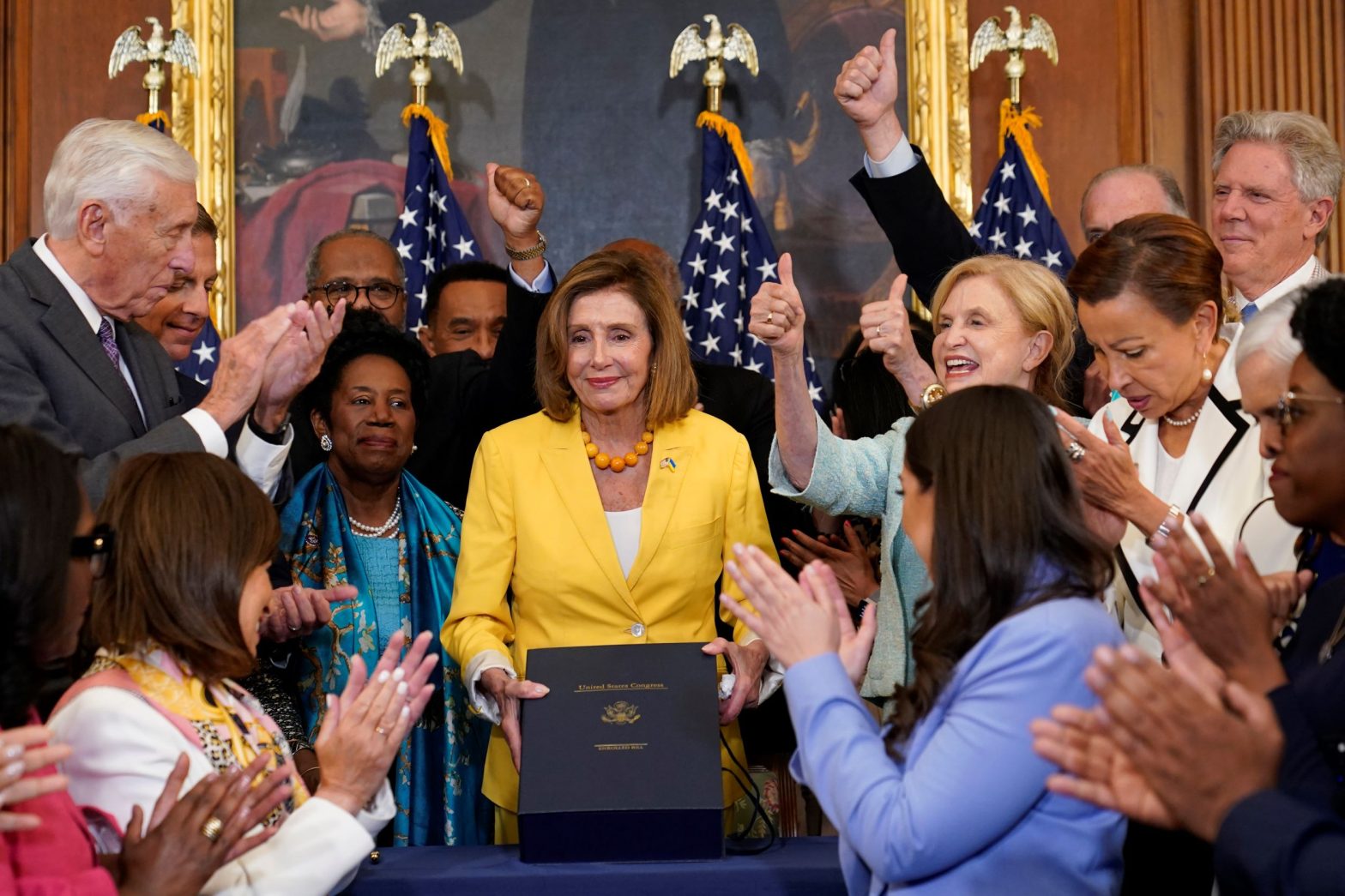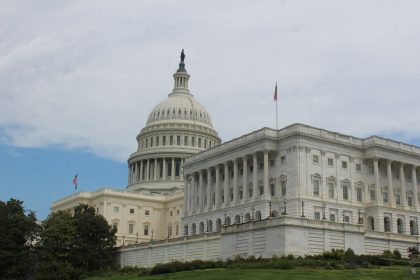House Passes Inflation Reduction Act, Sends on to President

WASHINGTON — The House on Friday afternoon gave its approval to the Inflation Reduction Act, delivering a significant victory to President Joe Biden.
The final vote was 220-207, along party lines. Four Republicans did not vote.
In a tweet from Kiawah Island, South Carolina, where he is vacationing, Biden said, “With the passage of the Inflation Reduction Act in the House, families will see lower prescription drug prices, lower health care costs, and lower energy costs. I look forward to signing it into law next week.”
A larger celebration of the passage of the bill is expected to be held at the White House when Congress returns to Washington in September.
The final passage of the bill is a major accomplishment for Democrats in both the House and Senate, allowing them to justifiably claim they achieved a number of long-sought objectives ahead of the upcoming midterm elections.
“Our Inflation Reduction Act is a robust cost-cutting package that meets the moment, ensuring that our families thrive and that our planet survives. This landmark [legislation], which we send to the president’s desk, starts — and it is a resounding victory for America’s families, starting at their kitchen table,” House Speaker Nancy Pelosi, D-Calif., said.
House Republican Leader Kevin McCarthy, on the other hand, criticized the Inflation Reduction Act, calling it “misguided and tone deaf.”
“Democrats — more than any other majority in history — are addicted to spending other people’s money, regardless of what we as a country can afford,” McCarthy said.
“They started this Congress with trillions in wasteful spending that caused runaway inflation,” he continued. “Now, they are choosing to end the session by spending half-a-trillion dollars more of your money, raising taxes on the middle class, and giving handouts to their liberal allies.”
Though much smaller than originally envisioned when Biden proposed his Build Back Better plan last year, the package sent to his desk for his signature contains scores of provisions addressing concerns about climate change, the future of energy, prescription drug prices and the federal deficit.
On the energy front, the bill includes major tax incentives and funding to promote the growth and proliferation of solar, wind and other renewable energy, battery storage, including hydrogen, and carbon capture.
At the same time, it includes several “near term” provisions boosting the fossil fuel and pipeline industries, provisions included to secure and maintain the support of Sen. Joe Manchin, D-W.Va.
The Inflation Reduction Act also enables Medicare to begin negotiating prices on some prescription drugs while shoring up health insurance subsidies.
Under the legislation, Medicare will be able to negotiate lower prices for 10 high-cost, but older drugs beginning in 2026, with the number climbing to 20 drugs by 2029.
To get Sen. Krysten Sinema, D-Ariz., to sign on to the deal hashed out by Manchin and Senate Majority Leader Chuck Schumer, D-N.Y., Democrats agreed that only older drugs are subject to negotiation after a period of nine years for most drugs and 13 years for more complex, so-called “biologic” drugs.
In a conference call with reporters ahead of Friday’s vote, House Majority Leader Steny Hoyer said, “this bill reflects much of what we wanted to see, but not everything we wanted to see, nevertheless, it is a very significant step forward.”
House Majority Whip James Clyburn, D-S.C., agreed.
“[This bill] is not everything that we wanted, but it is a glass that’s more than half full … and we’re going to continue to work to get it full.”
“I have been reading a lot in recent days about how this provision of the bill doesn’t go into effect until this year, and this provision starts at another time,” Clyburn continued. “In answer to people making these statements, let me point out that this is August and 2023 is just four months away.
“Some things in this bill are effective now, others will be out in the future. But the journey of 1,000 miles, we all learn early on, begins with a single step,” he said. “Let me assure you, we will make significant steps to get where we need to be.”
Significantly, the law will establish a ceiling that the negotiated price of the drugs cannot go above, and pharmaceutical companies risk the imposition of a 95% tax on the sale of their product if they refuse to engage in the negotiations.
On the revenue side, the legislation imposes a 15% minimum tax on the income that big corporations — those making $1 billion in annual earnings — report to their shareholders. The tax is expected to raise $222 billion over the next decade.
This provision, however, includes an exemption for companies taking advantage of accelerated depreciation to pay for capital investments and businesses that are subsidiaries of private equity firms.
An infusion of cash for the IRS — about $80 billion — is going toward increased enforcement, an effort expected to bring in an additional $204 billion annually.
The bill also enacts a 1% excise tax on stock buybacks.
The House returned to Washington to take up the legislation after it passed in the Senate following a marathon session last weekend. About 185 House members, both Republicans and Democrats, voted by proxy.
In the Senate, the bill passed on a final, party-line vote of 51-50, with Vice President Kamala Harris breaking the tie.
Up until about 10 days before the Senate vote, the Democrats’ dream of passing any semblance of Build Back Better was considered dead, due to opposition from Manchin, in particular.
Then, in a stunner after the Senate voted to pass the CHIPs bill fostering domestic research and technology, Manchin announced he and Schumer had a deal. With that, attention turned to getting Sinema on board, and after that, to the lengthy, “vote-a-rama” on proposed amendments.
The biggest change to the bill during this session, which began late last Saturday night and extended into last Sunday afternoon was the removal of a key provision to cap the price of insulin to $35 per month on the private insurance market.
The Republicans pushed for the elimination of that provision after the Senate parliamentarian ruled it was not compliant with the Senate’s reconciliation rules. A $35 cap on insulin for Medicare beneficiaries remains in place.
“There is much to like about the Inflation Reduction Act,” said Robert L. Bixby, executive director of the Concord Coalition, a nonpartisan watchdog of the nation’s debt and deficits.
“The prescription drug pricing reforms will help slow the rate of growth in Medicare, the energy provisions are an essential down-payment in combating climate change, and the revenue-raisers will help reduce future budget deficits,” Bixby said, “but the back-loaded nature of the savings is concerning.”
Dan can be reached at [email protected] and at https://twitter.com/DanMcCue.
























